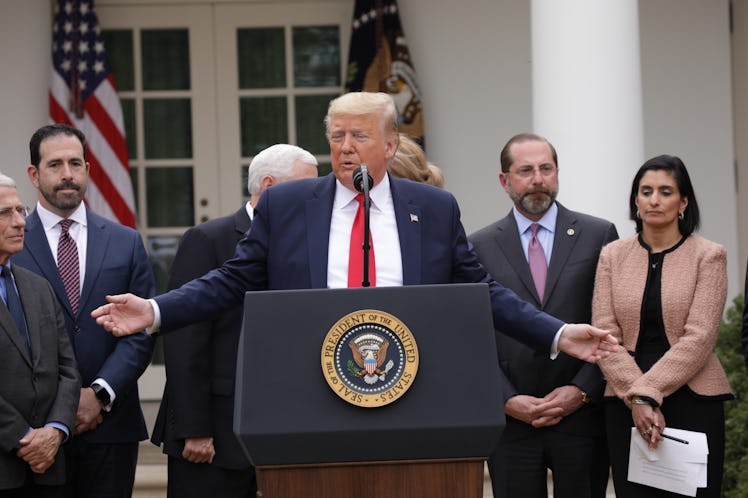
Here's What To Know About Your Student Loan Payments During The Coronavirus Pandemic
As the coronavirus outbreak, which the World Health Organization (WHO) declared a pandemic on March 11, continues to spread around the globe, many schools, businesses, and gathering places have been shut down. For some, this means a transition to studying or working at home. For others, it means the loss of a job. As many people are trying to figure out how to make ends meet during this crisis, you may be wondering, do you have to pay student loans during the coronavirus pandemic? You could be off the hook for at least six months.
The U.S. Department of Education (DOE) announced on March 20 that Americans could stop making payments on their federal student loans for up to 60 days without incurring a penalty. That's since been taken further, under the $2 trillion coronavirus stimulus package that President Donald Trump signed on March 27 to support workers, businesses, and health systems as they deal with the coronavirus pandemic. The stimulus package will suspend payments and interest on all DOE-held loans for six months, until September 30. However, borrowers would still be able to count these six months toward any student loan forgiveness program, including public loan service forgiveness.
If you currently have any federal student loans held by the DOE, your interest was automatically waived as of March 13. According to the DOE's federal student aid website, these loans include Direct Loans, as well as Federal Perkins Loans and Federal Family Education Loan (FFEL) Program loans held by the DOE. In short, you will be able to stop paying off your student loans until September 30, and you won't incur any interest during this period. If you continue making payments during this time, however, your full payment will go toward the principal on your student loan account (once you've paid off any interest you accrued before March 13).
There's also good news if you've defaulted on any of your federal student loans. On March 25, the DOE announced that it would stop collection actions on its student loan accounts for at least 60 days, backdated to March 13. That means that if you've defaulted on any of your DOE-held loans, the DOE will temporarily suspend its collections policy, and you don't have to worry about department officials seizing the money you owe from your paycheck, either. According to CNBC, the important thing for borrowers to remember is that if they do need to take a break from making student loan payments, they should remember to resume them — if they are able — once the six-month period specified in the stimulus package comes to an end. That's because falling behind on payments could potentially hurt your credit score, and you could end up accruing even more interest down the line.
Of course, this only applies to federally backed loans, not private loans, so it won't affect all borrowers. If you have private loans, you may want to contact your lender directly and find out what your options are. According to student loan giant Navient, some "qualified" private loan borrowers who have taken a financial hit from the pandemic may be eligible for up to three months of forbearance and postponed payments— if they request it.
In addition to creating some breathing room for student loan borrowers, the $2 trillion stimulus package also has some other financial help available. The package includes direct $1,200 payments to adults making under $75,000 per year, as well as increased financial assistance to hospitals, state and local governments, and small businesses. It also significantly expands unemployment benefits to assist workers who have lost their employment due to the coronavirus pandemic.
If you think you’re showing symptoms of coronavirus, which include fever, shortness of breath, and cough, call your doctor before going to get tested. If you’re anxious about the virus’s spread in your community, visit the CDC for up-to-date information and resources, or seek out mental health support. You can find all Elite Daily's coverage of coronavirus here.
This article was originally published on